- Government of Montenegro
Ministry of Education, Science and Innovation A conference of the Ministry of Science successful...
Please note: The page below represents the archived content relating to the previous Government of Montenegro. Some of the information might be inaccurate or outdated.
Archive
A conference of the Ministry of Science successfully completed: Montenegro on the right track to developing and strengthening innovative businesses
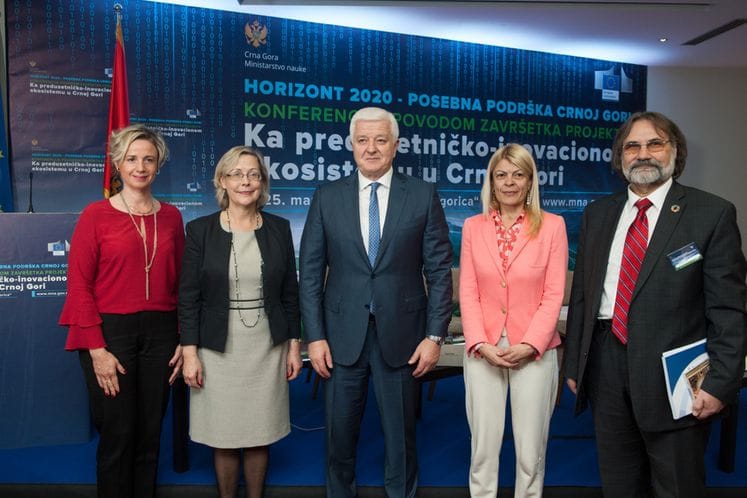
Published on: Mar 28, 2019 • 3:23 PM Author: Ministry of Science
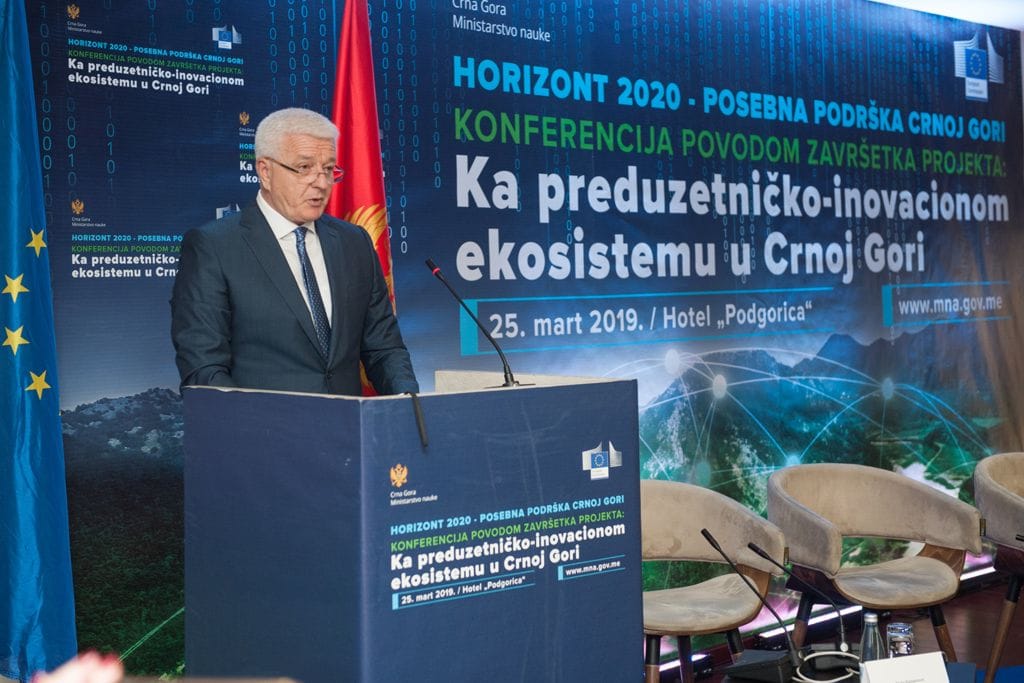
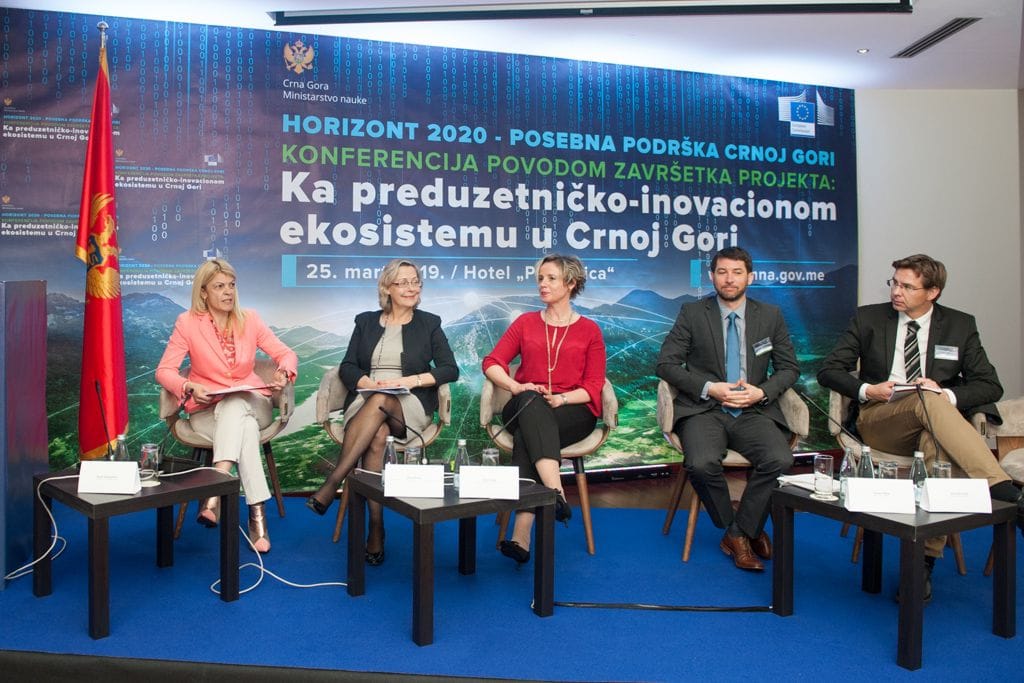
Yesterday, on 25 March, a conference entitled “Towards Entrepreneurial Innovation Ecosystems in Montenegro” was organised in Podgorica by the Ministry of Science. The event marked the completion of the EU project of support to Montenegro in the field of innovation policies, implemented through Horizon 2020 – Policy Support Facility – Specific Support to Montenegro.
Full support for the creation of a knowledge-based society was provided by Mr. Duško Marković, the Prime Minister of Montenegro, who opened the conference. On that occasion, PM Marković stressed that Montenegro had the capacity and possibilities to develop and strengthen the economic culture and that talent outflow to other countries needed to be prevented, as well as that all innovative businesses, especially in the field of information technologies, needed to be provided with better conditions in order for Montenegro to receive a new vital impetus for its economy.
Ms. Signe Ratso, Deputy Director-General for Research and Innovation of the European Commission, commended the implementation of the project in Montenegro and the progress made in the past period. Furthermore, she particularly reflected on the positive examples of building the elements of the entrepreneurial innovation system, both on the side of the state (Tehnopolis in Nikšić, innovation funding programmes launched), as well as in the private sector (launch of the Digital Factory by M-Tel, the innovative projects of Amplitudo and other similar companies). Finally, Ms. Ratso emphasised that the European Union was increasingly focusing on innovation itself, which is, inter alia, reflected in the fact that the European Innovation Council would be established through the new framework programme, Horizon Europe, bringing along a number of support instruments for innovative projects.
At the beginning of the conference, keynote speeches were delivered by Dr. Daria Tataj and Emeritus Professor Nebojša Nakićenović.
The conference consisted in three panels, which provided a forum to discuss models of strengthening the entrepreneurial innovation segment of the economy, creating a more favourable environment for the development of start-ups and other topics that are part of the recently adopted national Programme of Incentives for Innovative Start-ups.
In the first panel, Minister Damjanović and EU experts presented their experience with the project of support to Montenegro, giving recommendations on the ways of developing financial instruments that would support innovation and the possibilities of overcoming barriers by regulating electronic payments from abroad. In this context, the role of the Science and Technology Park of Montenegro was identified as particularly important, as it constitutes the central institution of the system in terms of creating the preconditions for opening a new chapter in the Montenegrin economy. Finally, according to the panelists, Montenegro can make a successful transition, as has been illustrated by the experiences of countries such as Estonia and Finland. In this regard, one of the most important messages of the panel was the need to involve the scientific and innovation diaspora of Montenegro in creating a new value as much as possible.
Full support for the creation of a knowledge-based society was provided by Mr. Duško Marković, the Prime Minister of Montenegro, who opened the conference. On that occasion, PM Marković stressed that Montenegro had the capacity and possibilities to develop and strengthen the economic culture and that talent outflow to other countries needed to be prevented, as well as that all innovative businesses, especially in the field of information technologies, needed to be provided with better conditions in order for Montenegro to receive a new vital impetus for its economy.
Ms. Signe Ratso, Deputy Director-General for Research and Innovation of the European Commission, commended the implementation of the project in Montenegro and the progress made in the past period. Furthermore, she particularly reflected on the positive examples of building the elements of the entrepreneurial innovation system, both on the side of the state (Tehnopolis in Nikšić, innovation funding programmes launched), as well as in the private sector (launch of the Digital Factory by M-Tel, the innovative projects of Amplitudo and other similar companies). Finally, Ms. Ratso emphasised that the European Union was increasingly focusing on innovation itself, which is, inter alia, reflected in the fact that the European Innovation Council would be established through the new framework programme, Horizon Europe, bringing along a number of support instruments for innovative projects.
At the beginning of the conference, keynote speeches were delivered by Dr. Daria Tataj and Emeritus Professor Nebojša Nakićenović.
The conference consisted in three panels, which provided a forum to discuss models of strengthening the entrepreneurial innovation segment of the economy, creating a more favourable environment for the development of start-ups and other topics that are part of the recently adopted national Programme of Incentives for Innovative Start-ups.
In the first panel, Minister Damjanović and EU experts presented their experience with the project of support to Montenegro, giving recommendations on the ways of developing financial instruments that would support innovation and the possibilities of overcoming barriers by regulating electronic payments from abroad. In this context, the role of the Science and Technology Park of Montenegro was identified as particularly important, as it constitutes the central institution of the system in terms of creating the preconditions for opening a new chapter in the Montenegrin economy. Finally, according to the panelists, Montenegro can make a successful transition, as has been illustrated by the experiences of countries such as Estonia and Finland. In this regard, one of the most important messages of the panel was the need to involve the scientific and innovation diaspora of Montenegro in creating a new value as much as possible.
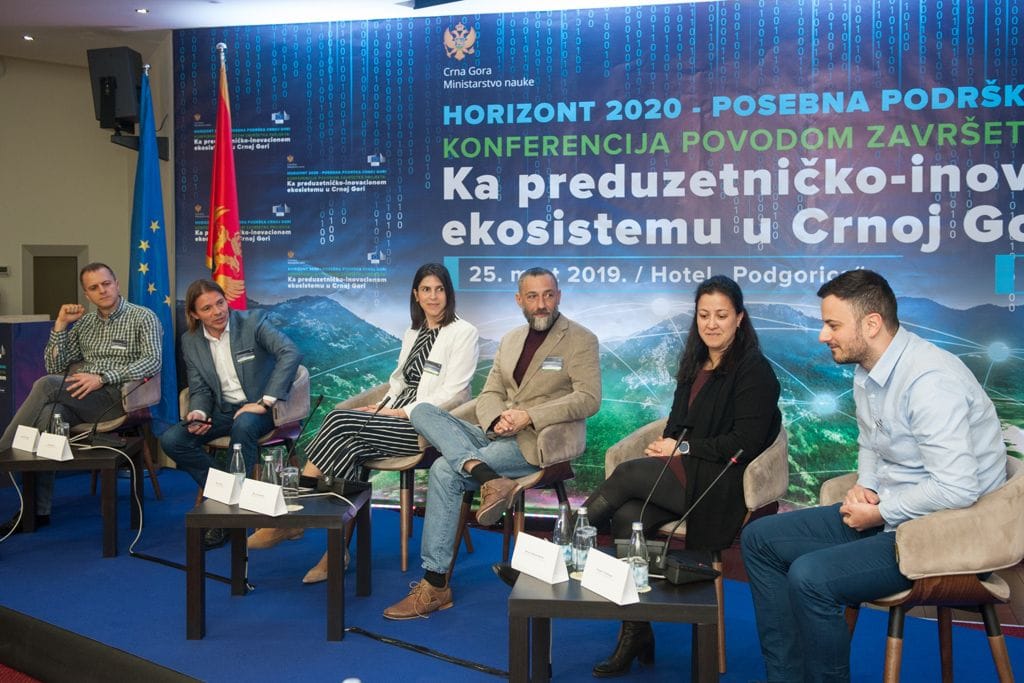
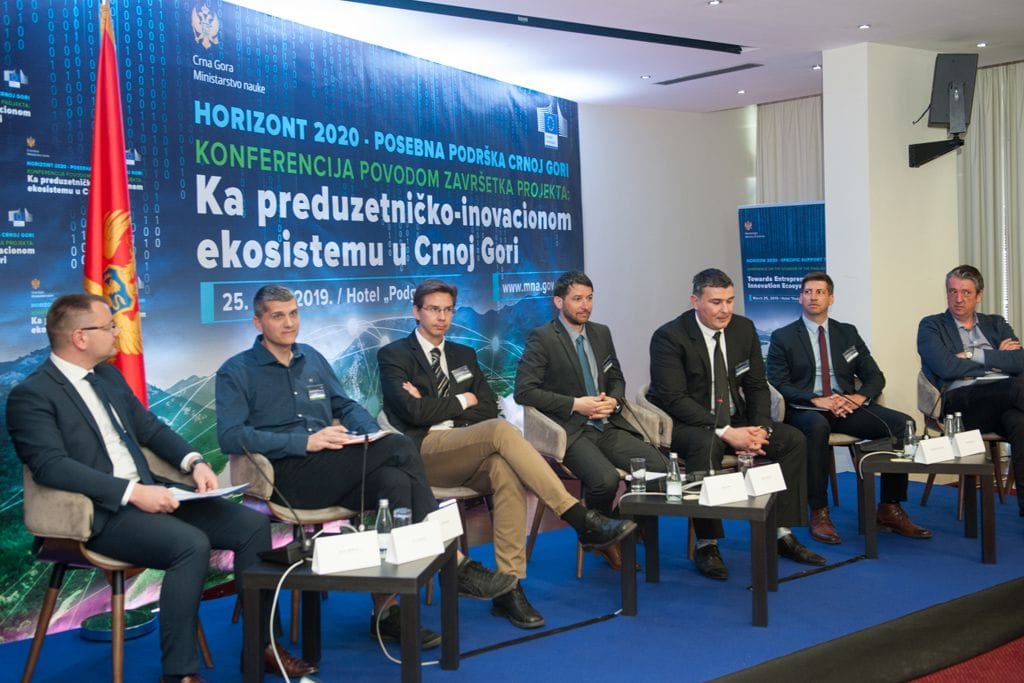
With a view to creating a better environment for young entrepreneurs to launch their ideas in Montenegro and expand them globally, it is necessary to direct efforts at networking of experts in creative teams. Furthermore, the educational system at universities needs to be adjusted and should enable models and projects through which higher education institutions and professors will support students who want to test their ideas and start their own companies. In this regard, one of the strongest impressions of the second panel discussion was the example of the Finnish Aalto University, which implements student practice and informal education in collaboration with prestigious companies from the first day of the study programme, creating an energetic and innovative environment.
The panelists of the third session discussed the need to amend the existing laws, as well as new legal acts that are currently being drafted, which should reduce the existing barriers to 21st-century businesses, while encouraging the development of innovative start-up businesses at the same time. Platforms for cooperation between researchers, entrepreneurs and public sector companies were also discussed, along with the advantages that Montenegro can offer in that respect. Finally, the panelists concluded that it was necessary to overcome the insufficient level of inter-sectoral cooperation, as well as to work on the development of investment culture in order to increase the number of private investors investing in young and innovative businesses.
Reflecting on the key elements for the development of an innovation ecosystem in Montenegro, participants emphasised leadership, trust, dialogue between the government and the private sector, legislative incentives for launching start-up businesses, as well as motivating and encouraging young people to establish their businesses. Furthermore, the great importance of the role of university in inspiring students to develop and implement their ideas was stressed.
The panelists of the third session discussed the need to amend the existing laws, as well as new legal acts that are currently being drafted, which should reduce the existing barriers to 21st-century businesses, while encouraging the development of innovative start-up businesses at the same time. Platforms for cooperation between researchers, entrepreneurs and public sector companies were also discussed, along with the advantages that Montenegro can offer in that respect. Finally, the panelists concluded that it was necessary to overcome the insufficient level of inter-sectoral cooperation, as well as to work on the development of investment culture in order to increase the number of private investors investing in young and innovative businesses.
Reflecting on the key elements for the development of an innovation ecosystem in Montenegro, participants emphasised leadership, trust, dialogue between the government and the private sector, legislative incentives for launching start-up businesses, as well as motivating and encouraging young people to establish their businesses. Furthermore, the great importance of the role of university in inspiring students to develop and implement their ideas was stressed.
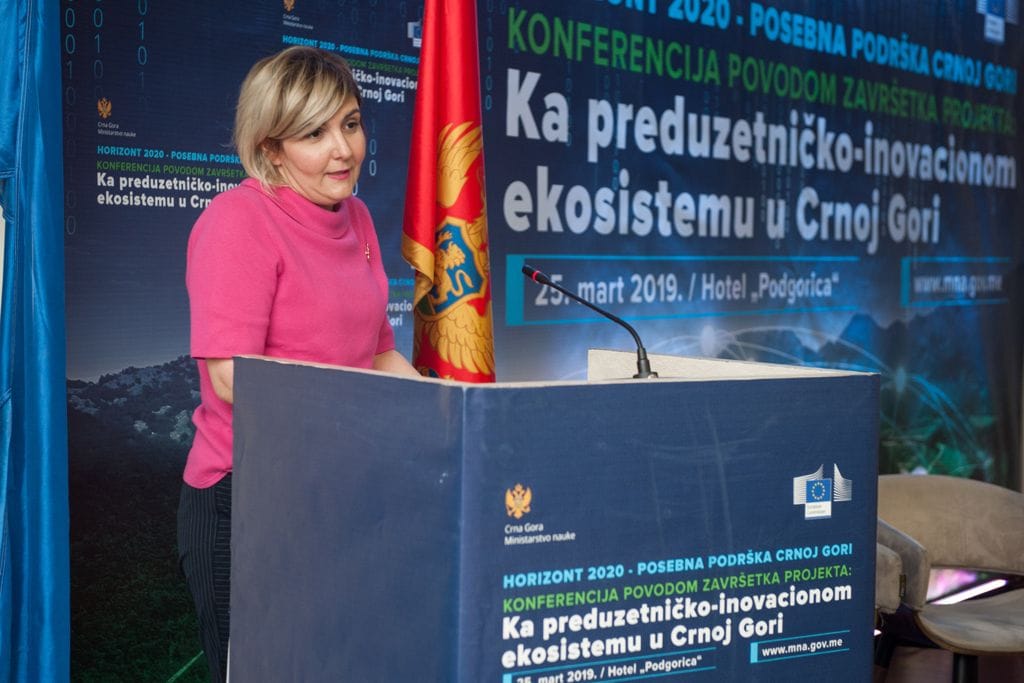
The successful conference was closed by Dragica Sekulić, Minister of Economy, who said that government policies and strategies were strongly directed at stimulating and strengthening the companies’ innovativeness and innovation growth, as important factors of further economic development. According to her, the capacity of Montenegro lying in young and highly educated people, especially those who acquired their education and experience in more developed countries, can be of great use in improving the overall business environment. In that regard, the programmes of the Ministry of Science and the Ministry of Economy support such initiatives and will be further improved through good communication and cooperation with the beneficiaries.
Related articles:
Request for prequalification Jan 17, 2025
Is this page useful?
